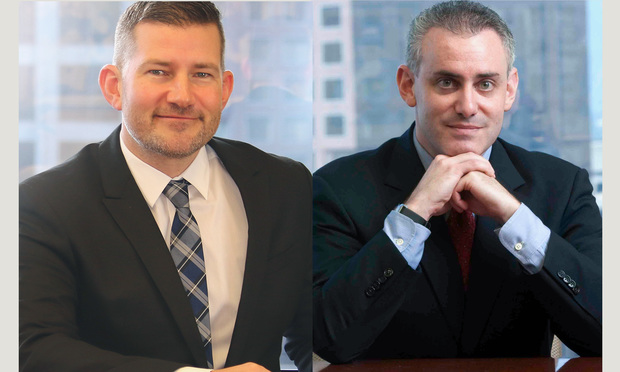California Court Issues Precedent-Setting Decision in Rockefeller Case
The high court's unanimous opinion has far-reaching consequences, as it held where parties to a contract containing a provision to arbitrate in California also agree to a specified manner of service, "that agreement supplants statutory service requirements ...."
April 06, 2020 at 02:30 PM
6 minute read
 Patrick Hammon, left, and Matthew Schechter, right, partners with McManis Faulkner.
Patrick Hammon, left, and Matthew Schechter, right, partners with McManis Faulkner.
On April 2, 2020, the California Supreme Court issued its opinion in Rockefeller Technology Investments (Asia) VII v. Changzhou Sinotype Technology Co. The high court's unanimous opinion has far-reaching consequences, as it held where parties to a contract containing a provision to arbitrate in California also agree to a specified manner of service, "that agreement supplants statutory service requirements and constitutes a waiver of formal service in favor of the agreed-upon method of notification." Put simply, because Rockefeller Technology Investments (Asia) VII (Rockefeller) and Changzhou Sinotype Technology Co. (SinoType) had agreed on a method of service, the Convention on the Service Abroad of Judicial and Extrajudicial Documents in Civil or Commercial Matters, Nov. 15, 1965, (the Hague Service Convention) did not override the terms of the parties' agreement.
By rejecting the analysis of the Court of Appeal, the California Supreme Court has taken a significant step in advancing California litigants' ability to contract around treaty protocols, which will lower the costs of initiating arbitration, allow service of process to become more efficient, and mitigate enforcement risks relating to the execution of agreements with international parties. And, by endorsing private agreements regarding service as a means of making arbitration more efficient, and recognizing that private service agreements may be tantamount to agreements to waive service altogether, the court's decision may open the door to wider acceptance of private agreements regarding service as well.
Rockefeller and SinoType signed a memorandum of understanding (MOU) to form a new company. Per the MOU, notice to a party was to be provided via Federal Express or other overnight mail, at the addresses provided in the MOU. The parties also submitted to jurisdiction in California and consented to service of process in the same manner as any other notice; and any disputes would be resolved via arbitration. The parties' relationship deteriorated, and the "long form agreements" were never completed. Pursuant to the MOU's dispute resolution provision, Rockefeller initiated an arbitration against SinoType for breach of the agreement. SinoType failed to participate in the arbitration and an award was entered in Rockefeller's favor.
Rockefeller subsequently filed a petition to confirm the arbitration award. In accordance with the MOU, Rockefeller served SinoType with its summons and petition by Federal Express at SinoType's headquarters in China. The award was eventually confirmed following a hearing at which SinoType did not appear.
Over a year after the award was confirmed, SinoType moved to set aside the judgment confirming the award, arguing that under the Hague Convention, Rockefeller had not validly served it with the summons and petition. The trial court denied the motion, but on appeal, the Court of Appeal reversed, concluding that the summons and petition to confirm the award were not served in accordance with the Hague Service Convention. Focusing on the language of the Convention's Article 10, the appellate court determined that private persons cannot agree to be served by alternative service methods—such as mail service—if their nation has objected to them. Because China had filed a "reservation" objecting to the service of documents in China "by the methods provided in Article 10," the court concluded that Rockefeller's service of legal documents was invalid, and the judgment confirming the award was void.
In reversing the intermediate appellate court, the Supreme Court began its analysis by framing the issue: did China's objection to the Hague Service Convention estop its citizens from entering private agreements regarding formal service of process that would otherwise be governed by Article 10? To answer that question, the court started by explaining that formal service of process advances two necessary objectives: (1) obtaining personal jurisdiction over the defendant, and (2) providing notification of court proceedings enabling a party to appear and defend itself.
Here, SinoType had expressly "submit[ted] to the jurisdiction of the Federal and State Courts in California" per the terms of the MOU, and had agreed to arbitrate in California. Under California law (see Code of Civil Procedure section 1293), California courts may exercise personal and subject matter jurisdiction over parties so as to enforce arbitration agreements formed in California. With respect to the question of notice, Section 1290.4(a), allows parties to an arbitration agreement "to waive otherwise applicable statutory requirements for service of summons."
Because paragraph 6 of the MOU expressly governed the manner in which the parties were to provide one another with notice, and as paragraph 7 contained language by which the parties consented to jurisdiction and agreed to service consistent with how notice was to be accomplished, the court concluded the parties had formed a permissible agreement for an "alternative form of notification" and thus waived formal service of process under California law. Important to this conclusion was the fact that the MOU not only contemplated a specific alternative form of notice, but also "that such notifications would take the place of formal service of process."
Ultimately, because the Hague Service Convention only applies to transmittals of documents that are "required as a necessary part of service," which is a question that "depends on state law," the Convention did not apply here as California law did not "require" Rockefeller to serve SinoType due to their waiver of formal service requirements through the MOU.
The decision is significant because it will "promote certainty and give effect to the parties' express intentions." In addition, and similar to what has been noted by courts in other jurisdictions who upheld parties rights to "contract" around the Convention, this decision will also discourage "gamesmanship and sharp practices" by preventing parties from agreeing to methods of service, but later seeking to negate those agreements by leaving the country. The decision should also serve to promote California's policies favoring arbitration "as a speedy and inexpensive means of settling disputes."
Finally, it should be noted that, while the court acknowledged that its "conclusions as to California law [were] narrow," the court did not explicitly opine on the issue of service of process in other contexts. This is significant, as arbitration agreements are not the only times where parties agree to particular methods of service and notice, or where parties consent to a particular court's jurisdiction. As a result, the decision in Rockefeller provides a roadmap for future courts where issues of private agreements regarding personal jurisdiction, service, and notice arise. Thus, going forward, we may see courts conclude that, in the civil context generally, rather than just arbitrations, such waivers of formal service of process will render the Hague Service Convention inapplicable to disputes arising under such agreements.
Patrick Hammon and Matthew Schechter are partners with trial law firm McManis Faulkner in San Jose. They may be reached at [email protected] and [email protected].
This content has been archived. It is available through our partners, LexisNexis® and Bloomberg Law.
To view this content, please continue to their sites.
Not a Lexis Subscriber?
Subscribe Now
Not a Bloomberg Law Subscriber?
Subscribe Now
NOT FOR REPRINT
© 2025 ALM Global, LLC, All Rights Reserved. Request academic re-use from www.copyright.com. All other uses, submit a request to [email protected]. For more information visit Asset & Logo Licensing.
You Might Like
View All
Law Firms Look to Gen Z for AI Skills, as 'Data Becomes the Oil of Legal'


Orrick Hires Longtime Weil Partner as New Head of Antitrust Litigation
Trending Stories
- 1'Every MAGA Will Buy It:' Elon Musk Featured in Miami Crypto Lawsuit
- 2Pennsylvania Law Schools Are Seeing Double-Digit Boosts in 2025 Applications
- 3Meta’s New Content Guidelines May Result in Increased Defamation Lawsuits Among Users
- 4State Court Rejects Uber's Attempt to Move IP Suit to Latin America
- 5Florida Supreme Court Disciplined 17 Attorneys
Who Got The Work
J. Brugh Lower of Gibbons has entered an appearance for industrial equipment supplier Devco Corporation in a pending trademark infringement lawsuit. The suit, accusing the defendant of selling knock-off Graco products, was filed Dec. 18 in New Jersey District Court by Rivkin Radler on behalf of Graco Inc. and Graco Minnesota. The case, assigned to U.S. District Judge Zahid N. Quraishi, is 3:24-cv-11294, Graco Inc. et al v. Devco Corporation.
Who Got The Work
Rebecca Maller-Stein and Kent A. Yalowitz of Arnold & Porter Kaye Scholer have entered their appearances for Hanaco Venture Capital and its executives, Lior Prosor and David Frankel, in a pending securities lawsuit. The action, filed on Dec. 24 in New York Southern District Court by Zell, Aron & Co. on behalf of Goldeneye Advisors, accuses the defendants of negligently and fraudulently managing the plaintiff's $1 million investment. The case, assigned to U.S. District Judge Vernon S. Broderick, is 1:24-cv-09918, Goldeneye Advisors, LLC v. Hanaco Venture Capital, Ltd. et al.
Who Got The Work
Attorneys from A&O Shearman has stepped in as defense counsel for Toronto-Dominion Bank and other defendants in a pending securities class action. The suit, filed Dec. 11 in New York Southern District Court by Bleichmar Fonti & Auld, accuses the defendants of concealing the bank's 'pervasive' deficiencies in regards to its compliance with the Bank Secrecy Act and the quality of its anti-money laundering controls. The case, assigned to U.S. District Judge Arun Subramanian, is 1:24-cv-09445, Gonzalez v. The Toronto-Dominion Bank et al.
Who Got The Work
Crown Castle International, a Pennsylvania company providing shared communications infrastructure, has turned to Luke D. Wolf of Gordon Rees Scully Mansukhani to fend off a pending breach-of-contract lawsuit. The court action, filed Nov. 25 in Michigan Eastern District Court by Hooper Hathaway PC on behalf of The Town Residences LLC, accuses Crown Castle of failing to transfer approximately $30,000 in utility payments from T-Mobile in breach of a roof-top lease and assignment agreement. The case, assigned to U.S. District Judge Susan K. Declercq, is 2:24-cv-13131, The Town Residences LLC v. T-Mobile US, Inc. et al.
Who Got The Work
Wilfred P. Coronato and Daniel M. Schwartz of McCarter & English have stepped in as defense counsel to Electrolux Home Products Inc. in a pending product liability lawsuit. The court action, filed Nov. 26 in New York Eastern District Court by Poulos Lopiccolo PC and Nagel Rice LLP on behalf of David Stern, alleges that the defendant's refrigerators’ drawers and shelving repeatedly break and fall apart within months after purchase. The case, assigned to U.S. District Judge Joan M. Azrack, is 2:24-cv-08204, Stern v. Electrolux Home Products, Inc.
Featured Firms
Law Offices of Gary Martin Hays & Associates, P.C.
(470) 294-1674
Law Offices of Mark E. Salomone
(857) 444-6468
Smith & Hassler
(713) 739-1250







